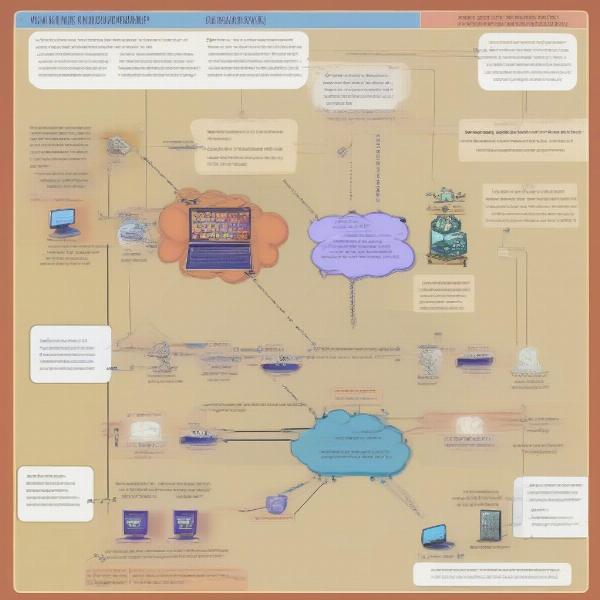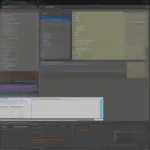Python, known for its versatility and beginner-friendliness, has found its way into the exciting world of game development. Yes, you absolutely can make games with Python! This dynamic language offers a range of tools and libraries that empower both novice and experienced developers to bring their game ideas to life.
Diving into Python Game Development
So, what makes Python a viable option for crafting games? Its clear syntax, extensive libraries, and supportive community contribute to a smooth development experience. Whether you’re envisioning a simple 2D platformer or a more complex text-based adventure, Python has something to offer. It’s a fantastic starting point for beginners, and even seasoned developers leverage its power for rapid prototyping and independent projects.
Choosing the Right Tools: Libraries for Python Game Development
Several libraries cater specifically to game development in Python. Pygame, arguably the most popular, provides functionalities for graphics, sound, and input handling. Kivy, another strong contender, excels in creating multi-touch applications and offers a modern, visually appealing interface. For 3D game development, Panda3D provides a robust engine with capabilities comparable to commercial solutions. The best library for you depends on your project’s scope and your personal preferences. For beginners, Pygame’s ease of use makes it a solid choice to get started.
For those looking to jump into game development without any cost, Python offers several free options to explore. You can create intriguing text-based games or explore simple 2D graphics using readily available libraries and tools. Similar to how do you create a video game for free, Python’s accessible nature makes it an attractive choice for budget-conscious developers.
Building Your First Game: A Step-by-Step Example
Let’s create a simple text-based adventure game to illustrate the process.
- Setting the Stage: Begin by defining the game’s setting and characters. Imagine a mystical forest with hidden treasures and challenging puzzles.
- Crafting the Story: Outline the plot and the player’s journey. Perhaps the player must find a magical artifact hidden deep within the forest.
- Implementing the Logic: Use Python’s conditional statements and loops to create interactive scenarios. For example, if the player chooses to go left, they might encounter a riddle. Choosing to go right could lead them to a helpful character.
- Adding User Input: Enable the player to make choices using the
input()function. This allows them to influence the story’s direction. - Testing and Refining: Thoroughly test your game, identifying and fixing bugs to ensure a smooth playing experience.
Beyond the Basics: Advanced Python Game Development
As your skills grow, explore more advanced concepts such as object-oriented programming, game AI, and networking. These elements can elevate your projects to a new level of complexity and engagement. Object-oriented programming, for example, allows for more organized and reusable code. If you are interested in learning which game engine is best for beginners, exploring different options available with Python can be a great starting point.
 Advanced Python Game Development Concepts
Advanced Python Game Development Concepts
From Python to Professional Development: Transitioning to Game Engines
While Python is excellent for learning the ropes and creating indie games, professional game development often involves powerful engines like Unity or Unreal Engine. These engines offer advanced graphics, physics simulations, and collaborative tools. The skills you gain with Python, such as problem-solving and logical thinking, will be invaluable when transitioning to these platforms. Just like learning how to create a text based game, mastering the fundamentals in Python sets you up for success in more complex environments.
“Starting with Python provides a solid foundation for aspiring game developers,” says Emily Carter, a seasoned game developer at a renowned studio. “It helps you grasp core programming principles before diving into the intricacies of game engines.”
Expanding Your Horizons: Resources for Python Game Developers
Numerous online resources, including tutorials, documentation, and communities, can assist you throughout your Python game development journey. Active forums and online communities provide a supportive environment for asking questions and sharing your progress. For those curious about how to get into video game development, exploring resources like these offers a valuable starting point. Embrace the wealth of knowledge available and never hesitate to reach out to fellow developers for guidance.
Expanding Your Game Development Skillset: Related Concepts
While Python provides a solid base for game creation, understanding related concepts can significantly enhance your abilities and open up new possibilities. Learning about game design principles, user interface (UI) and user experience (UX) design, and sound design can elevate your games from simple projects to engaging and immersive experiences. These aspects work in harmony with the technical skills to create a cohesive and enjoyable final product.
Conclusion: Embark on Your Python Game Development Adventure
Can You Make Games With Python? Absolutely! From simple text-based adventures to more complex graphical games, Python empowers you to bring your creative visions to life. Embrace the journey, learn from the resources available, and most importantly, have fun creating! Start small, experiment, and let your imagination soar as you explore the exciting world of Python game development.
FAQ
- What are the easiest Python libraries for beginners in game development? Pygame is generally considered the most beginner-friendly due to its simple syntax and comprehensive documentation.
- Can I create 3D games with Python? Yes, libraries like Panda3D offer robust tools for 3D game development.
- Is Python suitable for professional game development? While Python is excellent for learning and indie projects, professional development often involves dedicated game engines.
- Where can I find resources to learn Python game development? Numerous online tutorials, documentation, and communities offer valuable learning resources.
- What are the benefits of starting with Python for game development? Python’s clear syntax and versatility make it a great foundation for learning core programming concepts.
- What other skills are important for game development besides programming? Game design principles, UI/UX design, and sound design all contribute to a well-rounded game.
- Can I sell games made with Python? Yes, you can distribute and sell games created with Python, depending on the licenses of the libraries used.

